 W
WAbout a Boy is a 1998 coming of age novel written by British writer Nick Hornby which has sold over a million copies. The novel was later adapted into a feature film in 2002 and a television series in 2014.
 W
WAdrift In Soho is a novel by Colin Wilson. It was first published in England in 1961 by Victor Gollancz. The novel describes the English beat generation. The novel was republished to great acclaim by New London Editions in 2011, when Cathi Unsworth wrote 'Adrift in Soho is currently in production by Burning Films and with such rich source material, perhaps Wilson will now receive some contemporary reassessment for his continuing fascination with the human condition and the wit, warmth and insight that he brings to his accounts of those he has shared his unusual journeys with.'
 W
WAgnes Grey, A Novel is the debut novel of English author Anne Brontë, first published in December 1847, and republished in a second edition in 1850. The novel follows Agnes Grey, a governess, as she works within families of the English gentry. Scholarship and comments by Anne's sister Charlotte Brontë suggest the novel is largely based on Anne Brontë's own experiences as a governess for five years. Like her sister Charlotte's 1847 novel Jane Eyre, it addresses what the precarious position of governess entailed and how it affected a young woman.
 W
WThe Anatomy Lesson (1995) is a novel by John David Morley, inspired by Rembrandt’s painting The Anatomy Lesson of Dr. Nicolaes Tulp.
 W
WThe Awkward Age is a novel by Henry James, first published as a serial in Harper's Weekly in 1898–1899 and then as a book later in 1899. Originally conceived as a brief, light story about the complications created in her family's social set by a young girl coming of age, the novel expanded into a general treatment of decadence and corruption in English fin de siècle life. James presents the novel almost entirely in dialogue, an experiment that adds to the immediacy of the scenes but also creates serious ambiguities about characters and their motives.
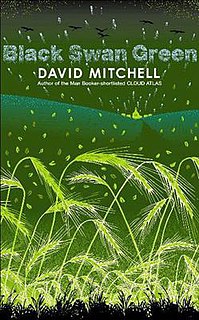 W
WBlack Swan Green is a semi-autobiographical novel written by David Mitchell. It was published in April 2006 in the U.S. and May 2006 in the UK. The bildungsroman's thirteen chapters each represent one month—from January 1982 through January 1983—in the life of 13-year-old Worcestershire boy Jason Taylor. The novel is written from the perspective of Taylor and employs many teen colloquialisms and popular-culture references from early-1980s England.
 W
WCelandine is a children's fantasy novel by Steve Augarde. It is the second book in the Touchstone Trilogy and was first published in 2006. Celandine is set ninety years before The Various, the first book of the trilogy. It follows the adventures of Celandine in the years 1914–1915, at the onset of World War I. Having run away from her detested boarding school, Celandine is too afraid to go home in case she is sent back. As she seeks shelter in the Wild Wood near her home, little does she think she will encounter a world where loyalty and independence is fiercely guarded, and where danger lurks in the most unlikely of places. Celandine's troubled character finds both refuge and purpose among the secret tribes of little people that she alone believes in.
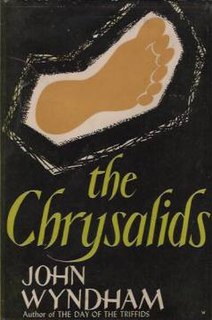 W
WThe Chrysalids is a science fiction novel by British writer John Wyndham, first published in 1955 by Michael Joseph. It is the least typical of Wyndham's major novels, but regarded by some as his best. An early manuscript version was entitled Time for a Change.
 W
WCluny Brown is a humorous coming of age novel by Margery Sharp, published in August 1944 by Collins in the UK and Little Brown in the US.
 W
WThe Country Girls is a trilogy by Irish author Edna O'Brien. It consists of three novels: The Country Girls (1960), The Lonely Girl (1962), and Girls in Their Married Bliss (1964). The trilogy was re-released in 1986 in a single volume with a revised ending to Girls in Their Married Bliss and addition of an epilogue. The Country Girls, both the trilogy and the novel, is often credited with breaking silence on sexual matters and social issues during a repressive period in Ireland following World War II and was adapted into a 1983 film. All three novels were banned by the Irish censorship board and faced significant public disdain in Ireland. O'Brien won the Kingsley Amis Award in 1962 for The Country Girls.
 W
WThe Cruise of the Breadwinner is a novella by the British author H. E. Bates. It was first published in 1946 and has been printed a number of times since. Much like the acclaimed novel Fair Stood the Wind for France, it is one of Bates' war-oriented pieces.
 W
WDaniel Martin is a novel by John Fowles. It was first published in 1977 and can be taken as a Bildungsroman, following the life of the eponymous protagonist. The novel uses both first and third person voices, whilst employing a variety of literary techniques such as multiple narratives and flashback. The author suggests that the book is concerned with "Englishness - what it is like to be English in the late 20th century.
 W
WDusty Answer is English author Rosamond Lehmann's first novel, published in 1927. She sent it unsolicited to publishers Chatto & Windus who agreed to publish it, saying it showed 'decided quality'. It went unnoticed on initial publication but then received an effusive review by respected critic Alfred Noyes of The Sunday Times who called it 'the sort of novel Keats would have written', which brought it to public attention and it became a bestseller, and according to The Guardian a 'landmark book of the interwar period'. Its success allowed her to leave her then husband and run off with maverick artist Wogan Philipps whom she later married.
 W
WThe Edwardians (1930) is one of Vita Sackville-West's later novels and a clear critique of the Edwardian aristocratic society as well as a reflection of her own childhood experiences. It belongs to the genre of the Bildungsroman and describes the development of the main character Sebastian within his social world, in this case the aristocracy of the early 20th century. “I ... try to remember the smell of the bus that used to meet one at the station in 1908. The rumble of its rubberless tyres. The impression of waste and extravagance which assailed one the moment one entered the doors of the house. The crowds of servants; people’s names in little slits on their bedroom doors; sleepy maids waiting about after dinner in the passages. I find that these things are a great deal more vivid to me than many things which have occurred since, but will they convey anything whatever to anyone else? Still I peg on, and hope one day to see it all under the imprint of the Hogarth Press, in stacks in the bookshops.”
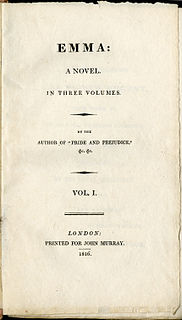 W
WEmma, by Jane Austen, is a novel about youthful hubris and romantic misunderstandings. It is set in the fictional country village of Highbury and the surrounding estates of Hartfield, Randalls and Donwell Abbey, and involves the relationships among people from a small number of families. The novel was first published in December 1815, with its title page listing a publication date of 1816. As in her other novels, Austen explores the concerns and difficulties of genteel women living in Georgian–Regency England. Emma is a comedy of manners, and depicts issues of marriage, sex, age, and social status.
 W
WEnglish Music is the sixth novel by Peter Ackroyd. Published in 1992, it is both a bildungsroman and, in the words of critic John Barrell, "partly a series of rhapsodies and meditations on the nature of English culture, written in the styles of various great authors." As with all Ackroyd's previous novels, it focuses on London, although on this occasion partly as a backdrop for English culture in general.
 W
WFrom the Heart, is a coming of age - and coming out novel by Susan Hill, published in March 2017 by Chatto and Windus.
 W
WGreat Expectations is the thirteenth novel by Charles Dickens and his penultimate completed novel, which depicts the education of an orphan nicknamed Pip. It is Dickens's second novel, after David Copperfield, to be fully narrated in the first person. The novel was first published as a serial in Dickens's weekly periodical All the Year Round, from 1 December 1860 to August 1861. In October 1861, Chapman and Hall published the novel in three volumes.
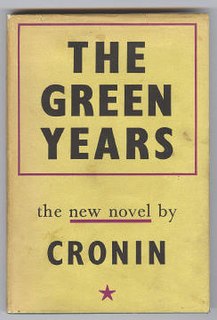 W
WThe Green Years is a 1944 novel by A. J. Cronin which traces the formative years of an Irish orphan, Robert Shannon, who is sent to live with his draconian maternal grandparents in Scotland. An introspective child, Robert forms an attachment to his roguish great-grandfather, who draws the youngster out of his shell with his raucous ways. The Green Years dominated The New York Times Fiction Best Sellers of 1945 for 17 weeks.
 W
WHarry Potter is a series of seven fantasy novels written by British author J. K. Rowling. The novels chronicle the lives of a young wizard, Harry Potter, and his friends Hermione Granger and Ron Weasley, all of whom are students at Hogwarts School of Witchcraft and Wizardry. The main story arc concerns Harry's struggle against Lord Voldemort, a dark wizard who intends to become immortal, overthrow the wizard governing body known as the Ministry of Magic and subjugate all wizards and Muggles.
 W
WHigh Fidelity is a novel by British author Nick Hornby first published in 1995. It has sold over a million copies and was later adapted into a feature film in 2000, a Broadway musical in 2006 and a TV series in 2020. In 2003, the novel was listed on the BBC's survey The Big Read.
 W
WHow to Build a Girl is a 2014 coming-of-age novel by English author and journalist Caitlin Moran, published by Ebury Press.
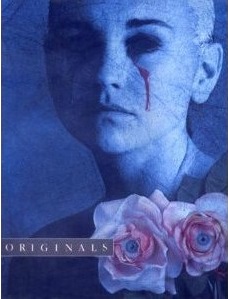 W
WIn the Eyes of Mr Fury is a gay, coming-of-age, magic realist, mystery novel by Philip Ridley. It was Ridley's first novel to be published, previously having his novella Crocodilia released in 1988. It was also the first book published in the Penguin Books Originals list. The novel has become a cult classic and became something of an underground phenomenon when published in Russia in 2004.
 W
WIngenious Pain is the first novel by English author, Andrew Miller, published in 1997. Set in the mid-18th century, the novel follows the picaresque adventures of James Dyer, an Englishman born without the ability to feel pain or pleasure. It won the James Tait Black Memorial Prize for Fiction, the International Dublin Literary Award and the Italian Premio Grinzane Cavour prize for a foreign language novel. The novel was also listed on the New York Times "Notable Books of the Year" for 1997.
 W
WJane Eyre is a novel by English writer Charlotte Brontë, published under the pen name "Currer Bell", on 16 October 1847, by Smith, Elder & Co. of London. The first American edition was published the following year by Harper & Brothers of New York. Jane Eyre is a Bildungsroman which follows the experiences of its eponymous heroine, including her growth to adulthood and her love for Mr. Rochester, the brooding master of Thornfield Hall.
 W
WJuggling is a 1994 novel by Barbara Trapido, nominated for the Whitbread Award that year. It is a sequel to her 1990 novel Temples of Delight, characters appearing as teenagers and young adults in the earlier book are now parents.
 W
WThe L-Shaped Room is a 1960 British novel by Lynne Reid Banks which tells the story of a young woman, unmarried and pregnant, who moves into a London boarding house, befriending a young man in the building. It was adapted into a film, with significant differences from the novel, by Bryan Forbes.
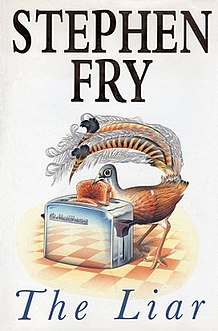 W
WThe Liar was the first novel of British writer and actor Stephen Fry. The story is told out of chronological order but mostly follows the upper-class Englishman Adrian Healey through his years at public school, at Cambridge University, and afterwards. He excels at lying and entire chapters are later revealed to have been fictions. He ultimately ends up teaching at Cambridge as part of an old boys' club in British intelligence, which alleviates its boredom during the decline of the empire and end of the Cold War by partaking in make-believe espionage missions.
 W
WThe Lonely Voyage is an adventure novel by English author John Harris. It is his first novel.
 W
WThe Longest Journey is a bildungsroman by E. M. Forster, first published in 1907. It is the second of Forster's six published novels, following Where Angels Fear to Tread (1905) and preceding A Room with a View (1908) and Howards End (1910). It has a reputation for being the least known of Forster's novels, but was also the author's personal favourite and one of his most autobiographical. It is the only one of Forster's novels not to have received a film or television adaptation.
 W
WMariana (1940) is the first novel by Monica Dickens. Mariana is a coming of age novel, which describes the growth and experience of Mary Shannon, a young English girl in the 1930s as the first hints of war begin to permeate English domestic life. First published by Michael Joseph, it was reprinted by Persephone Books in 1999 and is the second in their collection.
 W
WMary: A Fiction is the only complete novel by 18th-century British feminist Mary Wollstonecraft. It tells the tragic story of a female's successive "romantic friendships" with a woman and a man. Composed while Wollstonecraft was a governess in Ireland, the novel was published in 1788 shortly after her summary dismissal and her decision to embark on a writing career, a precarious and disreputable profession for women in 18th-century Britain.
 W
WMetroland is an English novel written by Julian Barnes and published in 1980, the author's first book.
 W
WNever Let Me Go is a 2005 dystopian science fiction novel by British author Kazuo Ishiguro. It was shortlisted for the 2005 Booker Prize, for the 2006 Arthur C. Clarke Award and for the 2005 National Book Critics Circle Award. Time magazine named it the best novel of 2005 and included the novel in its "100 Best English-language novels published since 1923—the beginning of TIME". It also received an ALA Alex Award in 2006. A film adaptation directed by Mark Romanek was released in 2010; a Japanese television drama aired in 2016.
 W
WNightmare Abbey is an 1818 novella by Thomas Love Peacock which makes good-natured fun of contemporary literary trends.
 W
WNorthanger Abbey is a coming-of-age novel and a satire of Gothic novels written by Jane Austen. It was completed in 1803, the first of Austen's novels completed in full, but was published posthumously in 1817 with Persuasion. The story concerns Catherine Morland, the naïve young protagonist, and her journey to a better understanding of herself and of the world around her.
 W
WOf Human Bondage is a 1915 novel by W. Somerset Maugham. It is generally agreed to be his masterpiece and to be strongly autobiographical in nature, although Maugham stated, "This is a novel, not an autobiography; though much in it is autobiographical, more is pure invention." Maugham, who had originally planned to call his novel Beauty from Ashes, finally settled on a title taken from a section of Spinoza's Ethics. The Modern Library ranked Of Human Bondage No. 66 on its list of the 100 best English-language novels of the 20th century.
 W
WOh My Darling Daughter is a humorous coming-of-age novel by Eric Malpass first published in 1970. Set in the fictitious Derbyshire village of Shepherd's Delight during Harold Wilson's first term as Prime Minister (1964–1970), Oh My Darling Daughter is about the Kembles, a well-to-do, conservative and church-going family of five, and in particular about Viola, the eponymous daughter of the house who, at 17, suddenly finds herself in a position of having to care for the rest of the family when her mother Clementine walks out on them after a row with her husband.
 W
WOne Morning Like a Bird is the fifth novel by English author, Andrew Miller, released on 4 September 2008 through Sceptre. The novel received mostly positive reviews.
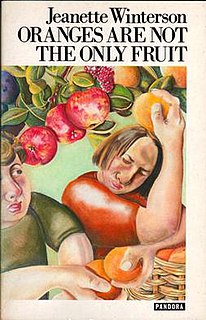 W
WOranges Are Not the Only Fruit is a novel by Jeanette Winterson published in 1985 by Pandora Press. It is a coming-of-age story about a lesbian girl who grows up in an English Pentecostal community. Key themes of the book include transition from youth to adulthood, complex family relationships, same-sex relationships, organised religion and the concept of faith.
 W
WOut of the Shelter (1970) is a novel by British author David Lodge.
 W
WThe History of Pendennis: His Fortunes and Misfortunes, His Friends and His Greatest Enemy (1848–50) is a novel by the English author William Makepeace Thackeray. It is set in 19th-century England, particularly in London. The main hero is a young English gentleman Arthur Pendennis, who is born in the country and sets out for London to seek his place in life and society. The novel took two years for Thackeray to write and, in line with other Thackeray's works, most notably Vanity Fair, it offers an insightful and satiric picture of human character and aristocratic society. The characters include the snobbish social hanger-on Major Pendennis and the tipsy Captain Costigan. Miss Amory and Sir Francis Clavering are somewhat reminiscent of Becky Sharp and Sir Pitt from Vanity Fair.
 W
WPig, is the debut novel of English author Andrew Cowan. Published in 1994 it won the Sunday Times Young Writer of the Year Award, a Betty Trask Award, the Ruth Hadden Memorial Award, the Authors' Club Best First Novel Award and a Scottish Council Book Award, and was shortlisted for five other awards.
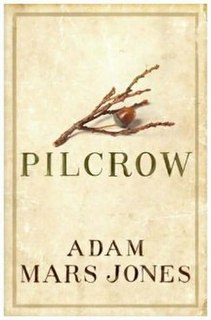 W
WPilcrow is a novel by Adam Mars-Jones first published in 2008 by Faber.
 W
WPorius: A Romance of the Dark Ages is a 1951 historical romance by John Cowper Powys. Set in the Dark Ages during a week of autumn 499 AD, this novel is, in part, a bildungsroman, with the adventures of the eponymous protagonist Porius, heir to the throne of Edeyrnion, in North Wales, at its centre. The novel draws from both Arthurian legend and Welsh history and mythology, with Myrddin (Merlin) as another major character. The invasion of Wales by the Saxons and the rise of the new religion of Christianity are central themes. Due to the demands of publishers and a paper shortage in Britain, Powys was forced to excise more than 500 pages from the 1951 version. It wasn't until 2007 that the full novel, as Powys intended his magnum opus to be, was published both in Britain and America.
 W
WSacred Country is a novel by English author Rose Tremain. It was published in 1992 by Sinclair-Stevenson and won both the James Tait Black Memorial Prize and Prix Femina étranger. It has been compared to Virginia Woolf's Orlando.
 W
WSeen Dimly before Dawn is a 1962 novel, a story of sexual awakening in adolescence, by the English author Nigel Balchin. Critical reception to the first edition was largely positive.
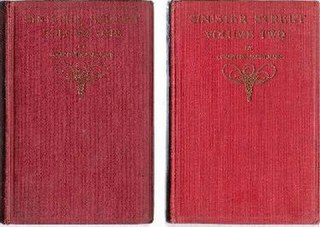 W
WSinister Street is a 1913–1914 novel by Compton Mackenzie. It is a kind of bildungsroman or novel about growing up, and concerns two children, Michael Fane and his sister Stella. Both of them are born out of wedlock, something which was frowned upon at the time, but from rich parents.
 W
WSleep Has His House is a novel by Anna Kavan. The novel is a dark coming of age narrative, which juxtaposes realistic semi-autobiographical accounting of life, with sections of subconscious wanderings.
 W
WA Song of Sixpence is a 1964 novel by A. J. Cronin about the coming to manhood of Laurence Carroll and his life in Scotland. Its sequel is A Pocketful of Rye.
 W
WSpies (2002) is a psychological novel by English author and dramatist Michael Frayn. It is currently studied by A-Level, and some GCSE, literature students in various schools. It is also studied by some Year 12 VCE English students in Australia.
 W
WSubmarine is a novel by Joe Dunthorne. First published by Hamish Hamilton in 2008, it was adapted into a film in 2010.
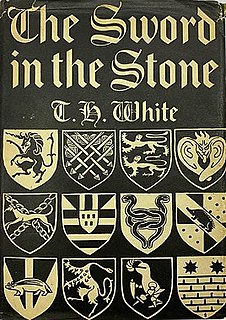 W
WThe Sword in the Stone is a novel by British writer T. H. White, published in 1938 as a stand-alone work, but later became the first part of a tetralogy, The Once and Future King. A fantasy of the boyhood of King Arthur, it is a sui generis work which combines elements of legend, history, fantasy and comedy. Walt Disney Productions adapted the story to an animated film, and the BBC adapted it to radio. Time included the novel in its list of the 100 Best Young-Adult Books of All Time.
 W
WThe Temple is a semi-autobiographical novel written by Stephen Spender, sometimes labelled a bildungsroman because of its explorations of youth and first love. It was written after Spender spent his summer vacation in Germany in 1929 and recounts his experiences there. It was not completed until the early 1930s. Because of its frank depictions of homosexuality, it was not published in the UK until 1988.
 W
WTime Must Have A Stop is a novel by Aldous Huxley, first published in 1944 by Chatto and Windus. It follows the story of Sebastian Barnack, a young poet, who holidays with his hedonistic uncle in Florence. Many of the philosophical themes discussed in the novel are explored further in Huxley's 1945 work, The Perennial Philosophy.
 W
WTipping the Velvet (1998) is a historical novel by Sarah Waters; it is her debut novel. Set in England during the 1890s, it tells a coming of age story about a young woman named Nan who falls in love with a male impersonator, follows her to London, and finds various ways to support herself as she journeys through the city. The picaresque plot elements have prompted scholars and reviewers to compare it to similar British urban adventure stories written by Charles Dickens and Daniel Defoe.
 W
WVillette is an 1853 novel written by English author Charlotte Brontë. After an unspecified family disaster, the protagonist Lucy Snowe travels from her native England to the fictional French-speaking city of Villette to teach at a girls' school, where she is drawn into adventure and romance.
 W
WWalkabout is a novel written by James Vance Marshall, first published in 1959 as The Children. It is about two children, a teenage sister and her younger brother, who get lost in the Australian Outback and are helped by an Indigenous Australian teenage boy on his walkabout. A film based on the book, with the same title came out in 1971, but deviated from the original plot.
 W
WWhat Maisie Knew is a novel by Henry James, first published as a serial in The Chap-Book and in the New Review in 1897 and then as a book later that year. It tells the story of the sensitive daughter of divorced, irresponsible and narcissistic parents. The book follows the title character from earliest childhood to precocious maturity.
 W
WWolf Solent is a novel by John Cowper Powys (1872–1963) that was written while he was based in Patchin Place, New York City, and travelling around the US as a lecturer. It was published by Simon and Schuster in May 1929 in New York. The British edition, published by Jonathan Cape, appeared in July 1929. This, Powys's fourth novel, was his first literary success. It is a bildungsroman in which the eponymous protagonist, a thirty-five-year-old history teacher, returns to his birthplace, where he discovers the inadequacy of his dualistic philosophy. Wolf resembles John Cowper Powys in that an elemental philosophy is at the centre of his life and, because, like Powys, he hates science and modern inventions like cars and planes, and is attracted to slender, androgynous women. Wolf Solent is the first of Powys's four Wessex novels. Powys wrote both about the same region as Thomas Hardy and was a twentieth-century successor to the great nineteenth-century novelist.